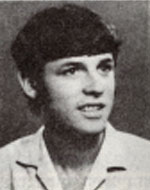Kalmar, Oren
Oren, son of Jeanette and Gustav, was born on August 7, 1952, in Bacau, Romania, where he studied in an elementary school. In February 1966, he immigrated to Israel and studied at the Amos De-Shalit High School in Rehovot, where his friends and family were named Louis. His name was abroad, and he was a diligent student and a cheerful, optimistic and talented boy. From an early age, he was interested in history. As a child, his mother used to read history stories to him, and as he grew older, he devoted a great deal of time to reading and studying this subject. His rich library had many history books. Oren was a friendly and adaptable boy. When he immigrated to Israel he was about fourteen, and soon he learned Hebrew, was involved in school life and was even elected to represent his class in the student council. He conducted struggles over teaching methods, grades and tests, and patterns of behavior and relations between teachers and students. From an early age, political views and opinions crystallized, based on the principles of justice and freedom, the struggle against injustice and injustice, and against wars and bloodshed. He has always been the head of the debate over democracy and politics, the character of the state and society. He had always defended his theories passionately. When he was a student at the Rehovot High School, he became interested in aviation and aerodynamics. He was a member of the “Scouts” movement as a trainee, and later served as a guide and was very much loved by his friends. He was a loyal, dedicated and knowledgeable soldier. Although he did not like army life, discipline, and the burden of orders, he performed the tasks he was assigned with diligence and talent. He was sent to the Tank Commanders Course and, thanks to his high grades, was chosen to instruct at the Armored Corps School. As a guide and commander, his positive qualities stood out, and his apprentices admired him for being a personal example. He never demanded anything from them that he did not commit himself, and he insisted on accuracy and perfection in execution. He spent most of his service in Sinai, and in his many letters he described how his tanks roared through the desert he loved. He complained of only one thing he had avoided in the field-reading his favorite history books. During the Yom Kippur War, Oren fought in the central sector of the Suez Canal. He was killed and killed in the battle on the 7th of Tishrei 5740 (October 7, 1973) and was brought to eternal rest in the cemetery in Rehovot. Survived by his parents and sister. After his fall, he was promoted to the rank of sergeant. In a letter of condolence to the bereaved family, his commander wrote that Oren was an excellent commander, who stuck to his missions with exemplary courage.
